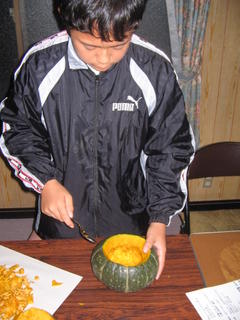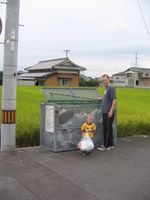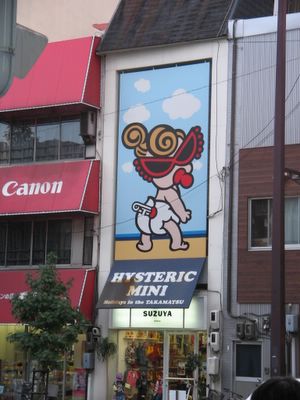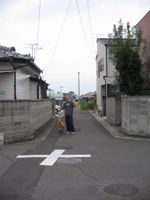Tuesday, October 25, 2005
Monday, October 24, 2005
The Monster at The End of This Book
Callan is apparently too young for sarcasm. Tonight while reading him stories, we tried to read “The Monster at the End of This Book,” which was one of my most favorite books growing up. It’s the sesame street book in which Grover tries to keep you from getting to the Monster at the end of the book by tying the pages shut, building a brick wall, and even begging. Mom used to do a pretty good Grover impersonation and I loved to turn the pages, even despite pitiful Grover. However, Callan merely got concerned, and then scared When Grover told him not to open the book. He took Grover very seriously when he said not to turn the pages, and when I did turn the page, Callan was bewildered that I would do such a horrible thing in the face of such desperation. He closed the book and said, “Scared, scared, Grover, scared.” I guess we’ll have to wait on that book, and stick with Thomas the Tank engine for now.
Sunday, October 23, 2005
More about the garbage bags
So I did some calculations.
One bag costs 40 yen. In Marugame there are 300,000 people. At an average of 3 people per household that's 100,000 households. If each household takes out the trash ten times a month (twice a week for burnable, twice a month for non burnable), then they are using ten garbage bags a month. 10 bags x 40 yen/bag x100,000 households equals 40,000,000 yen or a bit less than $400,000 a month in trash bags x 12 months is 4.8 million a year in trash bags. For our family that means 48 dollars a year on trash bags, just for burnable and non burnable garbage. Hmm....
One bag costs 40 yen. In Marugame there are 300,000 people. At an average of 3 people per household that's 100,000 households. If each household takes out the trash ten times a month (twice a week for burnable, twice a month for non burnable), then they are using ten garbage bags a month. 10 bags x 40 yen/bag x100,000 households equals 40,000,000 yen or a bit less than $400,000 a month in trash bags x 12 months is 4.8 million a year in trash bags. For our family that means 48 dollars a year on trash bags, just for burnable and non burnable garbage. Hmm....
Happy Halloween

For class tonight I taught three of my students to carve jack-o-lanterns out of small green Japanese pumpkins. They did really good considering it was their first time.
Halloween in this country is not really celebrated, except by English teachers and Mormons. The Japanese occasionally have parties, but most people I have spoken with outside the church have never been to a Halloween party. No one in Japan does trick or treating of course, and pumpkin carving is so uncommon that everyone has been really impressed with even the simple carving I did to show my classes.
The Halloween phenomena at church is likely a result of many years of missionary influence. Every ward and branch in the country has a Halloween party, but no one seems to know why. My boss said to me the other day, "Every year we have a Halloween party at the church. We don't know why we have it, but we must have it." I wasn't sure if her English use of the word 'must' meant that she really thought that somehow church policy or culture dictated that this little branch in Japan should celebrate a commercially driven pseudo-pagan holiday that promote adolescent mischief and premature tooth decay, or simply that because they have been doing Halloween parties for so long that to not do them would be weird.
This is Shoichiro. He is 14. Incidentally, his grandfather is a farmer on shodoshima island near here and he grew the second largest pumpkin in Japan this year. He is in Portland this weekend for the international pumpkin carving festival.

This is Tatsuya. He is 13 or 14 and he plays soccer with Shoichiro every Saturday pretty much all year long. His pumpkin was the most artful of the three. The girl in the white shirt in the background is Tatsuya's little sister, Ai. She was the first to get her pumpkin cut open and I think had the most fun of the three.

Wednesday, October 19, 2005
This ain't no Soccer Mom Minivan!

Joey took Callan with him to work this morning. I wanted to go for a walk and we needed to buy wipes and diapers so I thought I would walk to the store about 1.5 miles away. Often, when I go for a walk I wish I had brought the camera with me. Well this time I remembered! Here's the awesome van I saw. Would a van like this help my coolness factor when I have teenagers?!?
Saturday, October 15, 2005
Pork Barrel Garbage Bags
Pork Barrel Garbage Bags
Last month someone from the city delivered to our door several packages of amber colored transparent plastic garbage bags along with a letter stating that the bags were the new official city garbage bags for both burnable and non-burnable refuse. The letter explained that the new bags were supposed to be less harmful to the environment than the various bags currently in use and that starting in October everyone would be required to purchase and use the new bags.
I was initially pleased with the idea of new bags because they were larger and better quality than the current bags we were using. But then I went to the store and saw how much the new bags cost. Each large bag, which is probably about 20-30 gallons, is forty yen, or about 35 cents. The bags we were using before cost about a third of that, and they were bigger. Somewhere in Japan sits the fat politician responsible for the legislation that brought these bags to my door and I am convinced that he either owns stock in or is otherwise financially connected to the company responsible for making the ‘environmentally friendly’ garbage bags, and I hope he chokes on his chopsticks.
More about the bags later...
Last month someone from the city delivered to our door several packages of amber colored transparent plastic garbage bags along with a letter stating that the bags were the new official city garbage bags for both burnable and non-burnable refuse. The letter explained that the new bags were supposed to be less harmful to the environment than the various bags currently in use and that starting in October everyone would be required to purchase and use the new bags.
I was initially pleased with the idea of new bags because they were larger and better quality than the current bags we were using. But then I went to the store and saw how much the new bags cost. Each large bag, which is probably about 20-30 gallons, is forty yen, or about 35 cents. The bags we were using before cost about a third of that, and they were bigger. Somewhere in Japan sits the fat politician responsible for the legislation that brought these bags to my door and I am convinced that he either owns stock in or is otherwise financially connected to the company responsible for making the ‘environmentally friendly’ garbage bags, and I hope he chokes on his chopsticks.
More about the bags later...
Friday, October 14, 2005
Wanna see a fun car?
Grammar
Have you ever wondered about the difference between the following two phrases: ‘I got in the boat,’ and ‘I got on the boat’? Neither had I, until tonight during a private adult lesson with a man who works at a shipyard. We were talking about ship building and I said ‘on the boat,’ and he thought I met ‘on top of the boat’ and then I spent a half an hour trying to explain why in English, we get ‘on’ a bus, a plane, a ship, or a ferry, but we get ‘in’ a taxi, a car, or a canoe. The more I talk with these poor Japanese people who choose to subject themselves to our silly language, the more I am amazed that they can speak English at all. Not that I think English is impossible to get a handle on, there are plenty of fluent foreigners, it’s just that as a learner of Japanese, a language conveniently built upon an organized framework of strict rules and principles, with few exceptions, oddities, irregularities or contradictions, I can’t imagine putting up with a foreign language so inconsistent, illogical, and full of wholes as is English.
This problem pops up almost every day in my teaching, and makes explaining grammar practically worthless. Last week while trying to teach the phrase “I have to go to (blank)” to a group of ten year olds, I repeatedly had to correct their use (or rather misuse) of the ‘particular the.’ After one student said, ‘I have to go to pool,’ I explained that he should say, ‘the pool,’ which only confused another student who then said, ‘I have to go to the house.’ To him, I suggested saying ‘my house,’ to which he responded, ‘I have to go to the my house.’ Still another student offered the sentence, “I have to go to the school,’ which I stopped short of explaining was okay in some instances but not in others.
Though I admit it is a great disservice to my students, and I am sure it is the reason Japanese English learners have such a problem with the nuances of English, at this point in the grammar tailspin I usually choose to do what most English teachers in this country have chosen to do, and ignore the mistakes and focus on helping my students with the overall meaning, hoping that someday they’ll figure it out.
This problem pops up almost every day in my teaching, and makes explaining grammar practically worthless. Last week while trying to teach the phrase “I have to go to (blank)” to a group of ten year olds, I repeatedly had to correct their use (or rather misuse) of the ‘particular the.’ After one student said, ‘I have to go to pool,’ I explained that he should say, ‘the pool,’ which only confused another student who then said, ‘I have to go to the house.’ To him, I suggested saying ‘my house,’ to which he responded, ‘I have to go to the my house.’ Still another student offered the sentence, “I have to go to the school,’ which I stopped short of explaining was okay in some instances but not in others.
Though I admit it is a great disservice to my students, and I am sure it is the reason Japanese English learners have such a problem with the nuances of English, at this point in the grammar tailspin I usually choose to do what most English teachers in this country have chosen to do, and ignore the mistakes and focus on helping my students with the overall meaning, hoping that someday they’ll figure it out.
Wednesday, October 12, 2005
Falling Asleep in Class
Takatsugu is a mystery to me. Takatsugu is the ten year old boy I teach for an hour every Wednesday night and his is the only class I have ever fallen asleep in. I didn’t think it was possible to fall asleep in a class I was teaching, especially not a private lesson where I am front and center the whole time, but every week without fail I find myself nodding off in front of this boy. It’s as if his mere presence drains all the energy from the room. I don’t get it. Taka, as I like to call him, is a quiet boy who appears to have some sort of speech problem, but other than that he is a fairly normal Japanese 10 year old. He likes playing video games, reading comic books, and watching anime on television.
Part of me thinks the hour long lesson is just too long for the both of us. He is far from talkative, and though he knows quite a bit of English, his speech problem means he doesn’t say a lot. It’s not that he is unenthusiastic—more like tired of studying. I haven’t asked him, but I am sure that he, like most of my other students, in addition to their regular school day, attends not only my English class, but other after school tutoring programs as well. If I were 10 years old and had an hour long English class, by myself, at 7 in the evening, I would be a little stir crazy too.
I’m not sure if he has noticed me nodding off, but If I don’t figure out something soon, he is sure to notice, and I don’t know what I will do if my boss calls me up one day and says, ‘Joe, Takatsugu says you were falling asleep in class?”
Part of me thinks the hour long lesson is just too long for the both of us. He is far from talkative, and though he knows quite a bit of English, his speech problem means he doesn’t say a lot. It’s not that he is unenthusiastic—more like tired of studying. I haven’t asked him, but I am sure that he, like most of my other students, in addition to their regular school day, attends not only my English class, but other after school tutoring programs as well. If I were 10 years old and had an hour long English class, by myself, at 7 in the evening, I would be a little stir crazy too.
I’m not sure if he has noticed me nodding off, but If I don’t figure out something soon, he is sure to notice, and I don’t know what I will do if my boss calls me up one day and says, ‘Joe, Takatsugu says you were falling asleep in class?”
Energy Hogs


I like to conserve energy. Electric energy that is. So for the most part washing and hanging clothes out to dry here hasn't been too bad. But today I miss my energy gobbling American washer and dryer. Three days ago I had to wash Callan's big blanket he uses as a sheet on top of his tri-fold mat bed. (My fault, I should have changed his diaper BEFORE his nap). Our washer, as you can see is very small. And taking anything to the laundromat is very expensive and a big hassle since Joey has the car most of the time. So I washed the blanket in the bathtub. Then hung it up on the bar over the tub (the other picture) and sprayed it on both sides to rinse it out. Then I tried to squeeze out most of the water and let it drip for a while. Then I dragged it outside to the clothesline (bar) oustide and left it to dry. Well, it was sunny when I put it out there. But after it dried the rain came again and ruined all the work the sun had just done. It finally dried and I put it on Callan's bed. It only lasted one night however, this time needing to be washed because of a leaking Poopy diaper. Ugh. So I dumped it back in the bath tub and repeated the whole routine. I guess expending human energy is preferable to electric energy, but today I want my Kenmore Energy Hogs!
Sunday, October 09, 2005
The Harvest
An essay I’m working on. Very rough…grammar police beware
After finishing the Sunday afternoon conference session today we dropped Callan into his stroller and went out to enjoy autumn as it settles in around our little neighborhood. As we turned off our street onto the main road, the first evidences of fall began to appear around us. Many people were out with their children or pets enjoying the cool air and the high dark clouds above us that cast a warm evening glow on the green fields of rice.
All of the neighborhood rice fields were alive with the bustle of the harvest. Much of the rice farming done on a local level is overseen by elderly couples who work together planting, caring for and harvesting the crops in much the same way their parents did before them, except that most now use miniature rice combines that look a bit like big riding lawn mowers. It is not uncommon to see a man in his seventies riding one of these miniature rice combines around a small field not much larger than a convenience store parking lot. Along side him, working the large burlap bags used for collecting the grain, is often an old woman whose back is permanently arched forward from years of rice field labor.
On this day we saw what looked like a granddaughter in her mid twenties working along side her grandparents in the fields. Together they stacked nearly a dozen burlap sacks full of rice onto the back of a small tractor and drove it down the narrow rice patty road to a farm house for processing. I imagine that young woman sixty years from now, hunched and weathered, leaning on a rake as she watches the rice roll down the narrow road for processing and I wonder if she’ll ever make it that far. It seems that Japan is at a cultural impass. The rice farming generation seems destined to whither away. Of course the Japanese will always eat rice, but what will become of the fields these old people work in year after year when they die. Is there another generation prepared to take over?
One woman we talked with today has lived in the same house for eighty years. She was born there, raised her own children there and now is a lonely widow there. Her children visit, but not enough. “We all live apart,” she said, squatting beside an irrigation ditch with her back to a large patch of incredible red flowers that I am sure she cared for herself. “Japan didn’t use to be this way. Eight people used to live in this house. When I got married my husband moved in here.” She gestured towards the derelict house beside her and I noticed bare bamboo from the daub and waddle walls poking out from behind the rusty sheet metal siding. I tried to imagine eight people living in the small home, working the land and eating what they grew. “Japan is different now, everything is becoming just like America.” She gave me a look out of the corner of her eye that was halfway accusatory, half way apologetic. I could tell she wasn’t angry, but perhaps disappointed in her own culture for not being strong enough to withstand western influences. She was right though. The Japanese even have a cute English phrase they use to describe the phenomenon. The old tradition of several generations living under the same roof has been replaced by the very western desire for ‘my home,’ a piece of real estate separate from the in-laws, with its own space, its own rules, and its own mortgage. Thanks in part to western influences ‘my home,’ has become the goal for middle class Japanese families, and as a result, the 80 year old woman I spoke with today is living alone in a shanty next to a rice field and a garden patch that her family has probably worked on for hundreds of years, and no doubt wonders who will tend her flowers when she is gone.
A little farther down that sliver of asphalt that runs between the houses and rice fields we stopped to talk for a moment with a grandpa pushing a wheelbarrow full of uprooted flowers who was accompanied by his daughter and her one year old son. The grandpa said he’d lived here for fifty years, and from the looks of it he was doing his part to make sure his grandson would carry on after him.
Still farther down the road, we were greeted by some elementary school kids trying to catch fish in an irrigation ditch. ‘Haro’ they said, eager to practice the little English they knew. Sunday is the only day I see kids playing in this country. It’s the day when they exchange school uniforms and a school issued bicycle helmet for cut off shorts and loose t-shirts printed with unintelligible English. As I looked at them I thought of the students I work with. These kids are still young, but as junior high school approaches, they will, like so many of my students spend much of their extra time in cram schools with tutors like me, trying to get a leg up on the next entrance exam.
We wished them well and headed home. The fall is beautiful here. It’s a rare time in Japan when progress in the western sense is overshadowed for the tiniest moment by the Japanese version of progress that grows in small family owned fields and is harvested into heavy burlap sacks by elderly farmers who may not have a future generation to whom they can pass on their craft.
After finishing the Sunday afternoon conference session today we dropped Callan into his stroller and went out to enjoy autumn as it settles in around our little neighborhood. As we turned off our street onto the main road, the first evidences of fall began to appear around us. Many people were out with their children or pets enjoying the cool air and the high dark clouds above us that cast a warm evening glow on the green fields of rice.
All of the neighborhood rice fields were alive with the bustle of the harvest. Much of the rice farming done on a local level is overseen by elderly couples who work together planting, caring for and harvesting the crops in much the same way their parents did before them, except that most now use miniature rice combines that look a bit like big riding lawn mowers. It is not uncommon to see a man in his seventies riding one of these miniature rice combines around a small field not much larger than a convenience store parking lot. Along side him, working the large burlap bags used for collecting the grain, is often an old woman whose back is permanently arched forward from years of rice field labor.
On this day we saw what looked like a granddaughter in her mid twenties working along side her grandparents in the fields. Together they stacked nearly a dozen burlap sacks full of rice onto the back of a small tractor and drove it down the narrow rice patty road to a farm house for processing. I imagine that young woman sixty years from now, hunched and weathered, leaning on a rake as she watches the rice roll down the narrow road for processing and I wonder if she’ll ever make it that far. It seems that Japan is at a cultural impass. The rice farming generation seems destined to whither away. Of course the Japanese will always eat rice, but what will become of the fields these old people work in year after year when they die. Is there another generation prepared to take over?
One woman we talked with today has lived in the same house for eighty years. She was born there, raised her own children there and now is a lonely widow there. Her children visit, but not enough. “We all live apart,” she said, squatting beside an irrigation ditch with her back to a large patch of incredible red flowers that I am sure she cared for herself. “Japan didn’t use to be this way. Eight people used to live in this house. When I got married my husband moved in here.” She gestured towards the derelict house beside her and I noticed bare bamboo from the daub and waddle walls poking out from behind the rusty sheet metal siding. I tried to imagine eight people living in the small home, working the land and eating what they grew. “Japan is different now, everything is becoming just like America.” She gave me a look out of the corner of her eye that was halfway accusatory, half way apologetic. I could tell she wasn’t angry, but perhaps disappointed in her own culture for not being strong enough to withstand western influences. She was right though. The Japanese even have a cute English phrase they use to describe the phenomenon. The old tradition of several generations living under the same roof has been replaced by the very western desire for ‘my home,’ a piece of real estate separate from the in-laws, with its own space, its own rules, and its own mortgage. Thanks in part to western influences ‘my home,’ has become the goal for middle class Japanese families, and as a result, the 80 year old woman I spoke with today is living alone in a shanty next to a rice field and a garden patch that her family has probably worked on for hundreds of years, and no doubt wonders who will tend her flowers when she is gone.
A little farther down that sliver of asphalt that runs between the houses and rice fields we stopped to talk for a moment with a grandpa pushing a wheelbarrow full of uprooted flowers who was accompanied by his daughter and her one year old son. The grandpa said he’d lived here for fifty years, and from the looks of it he was doing his part to make sure his grandson would carry on after him.
Still farther down the road, we were greeted by some elementary school kids trying to catch fish in an irrigation ditch. ‘Haro’ they said, eager to practice the little English they knew. Sunday is the only day I see kids playing in this country. It’s the day when they exchange school uniforms and a school issued bicycle helmet for cut off shorts and loose t-shirts printed with unintelligible English. As I looked at them I thought of the students I work with. These kids are still young, but as junior high school approaches, they will, like so many of my students spend much of their extra time in cram schools with tutors like me, trying to get a leg up on the next entrance exam.
We wished them well and headed home. The fall is beautiful here. It’s a rare time in Japan when progress in the western sense is overshadowed for the tiniest moment by the Japanese version of progress that grows in small family owned fields and is harvested into heavy burlap sacks by elderly farmers who may not have a future generation to whom they can pass on their craft.
Thursday, October 06, 2005
Raising Children part 1
Lying in bed last night, trying to overcome a caffeine buzz induced by a few handfuls of semi-sweet chocolate chips (which for a no-coke, no-coffee drinking Mormon is quite a buzz), I turned over to Melissa and said, ‘Do you realize Olivia will be five when we get home?” Four year old Olivia is my Brother Jason’s oldest child, and until that moment had remained in my mind very much a baby. I lived with Jason and his wife for a few months after Olivia was born during my first year of college, and remember the nights they spent calming her colic, the systematic way in which they manufactured her bottles of formula, and the tears they shed as they adjusted to being parents.
At the time I was an indifferent observer, a single sibling with nothing to worry about except homework and hormones, and could not have imagined what they were going through. I could not fathom the sleep deprivation that came from trying to teach a new baby to sleep, nor could I have guessed the stress my brother felt as a full-time student trying to raise a family on a part time salary.
Likewise, I had no taste of the joy they felt as they watched Olivia bend her face into the first inklings of expression, developing the beginnings of a little human personality. Certainly I had no idea how quickly they would begin to feel like their little girl was no longer a baby. I regret the disinterested attitude with which I came and went while I lived there.
At the time I was an indifferent observer, a single sibling with nothing to worry about except homework and hormones, and could not have imagined what they were going through. I could not fathom the sleep deprivation that came from trying to teach a new baby to sleep, nor could I have guessed the stress my brother felt as a full-time student trying to raise a family on a part time salary.
Likewise, I had no taste of the joy they felt as they watched Olivia bend her face into the first inklings of expression, developing the beginnings of a little human personality. Certainly I had no idea how quickly they would begin to feel like their little girl was no longer a baby. I regret the disinterested attitude with which I came and went while I lived there.
Monday, October 03, 2005
Sunday, October 02, 2005
Nursery: "The entrance to Hell?"
Today Melissa’s translator for primary couldn’t come to church so I got to spend all three hours of church with her. There are eight or so kids in primary ranging from age four to age 10 and they come from three different families. Melissa taught a lesson about following the counsel of the prophets and she passed out little slips of paper with either good things (i.e. be honest, read your scriptures, be kind) or bad things (steal, fight, be lazy) written on them. She then asked each of the students which things were likely prophetic counsel and which were not. When ever a ‘bad thing’ was read Melissa instructed the students to tear up the pieces of paper (which they enjoyed thoroughly and which I thought was rather effective).
After Class, there was a fifteen minute lull before sharing time started and the kids got a little wild. Someone had taped a sign on the nursery door that read ‘This is the place to play.’ Apparently one of Melissa’s students didn’t like that sign because I saw him put up a sign on the door that read ‘Entrance to Hell.’ I couldn’t help but laugh pretty hard before I kindly suggested that we take it down. Church is great.
After Class, there was a fifteen minute lull before sharing time started and the kids got a little wild. Someone had taped a sign on the nursery door that read ‘This is the place to play.’ Apparently one of Melissa’s students didn’t like that sign because I saw him put up a sign on the door that read ‘Entrance to Hell.’ I couldn’t help but laugh pretty hard before I kindly suggested that we take it down. Church is great.
Thursday, September 29, 2005

We went to the Seto Ohashi Commorative Park last week but they closed earlier than we thought. So we went back today to play on the playground and go to the museum. Wow! The bridge is huge and it took them 9 1/2 years to build it. The park is beautiful, especially a series of fountains designed to look like the suspension parts of the Seto. Very cool!! Here's a link if you're interested :http://www.kagawa-edu.jp/sakakh01/enghtmlsrc/setobreng.html

Wednesday, September 28, 2005

The garbage in Japan is really quite funny. There are 5 different kinds of gomi(garbage) throughout the month: combustible, incombustible, recyclables, PET bottles (which a most of the plastic drink bottles) and oki gomi (basically anything big around the house you don't want anymore, beds, couches, appliances, etc.). The combustible garbage is twice a week and all the others are on specific days of the month. It's funny to drive around the town in the morning and see huge piles of garabage on every corner. Ours at least has a basket to put the garbage in, it keeps it tidy!

Tuesday, September 27, 2005

The front of our house with the covered entry way and sunroom to the left. The house stops behind the sunroom so the second story windows are the neighbors. The silver car is not ours, our boss' daughter parks her car at our house because there are not enough spots at their house. (And you can't park long-term on the street, it's too narrow!)


For Callan's birthday we went to the Seto Inland Sea Bridge Memorial Park. There is a large playground, a museum, and plenty of green space ( complete with real grass.) Some friends from the ward (Remy and Kelly Walthers, and Matt and Twila Jensen) came along and we had a picnic and Callan opened presents. This picture is of him and his new baseball bat.

Sunday, September 25, 2005
One Good Sunday
After church is always busy for us. Today Melissa went Visiting teaching right after church so Callan and I hung out in the chapel until she was done. While we were waiting I got asked to sit in on a lesson with the missionaries, so I passed Callan off to a few of the American sisters who were still at the church and Went with the Missionaries. Melissa got done visiting teaching and took Callan home. Meanwhile I got to see first hand the new missionary approach at work (by ‘new approach’ I am referring to the fact that missionaries no longer use memorized discussions, but are instead instructed to study the doctrine and formulate lessons based on the needs of those who teach. This is much different from even four years ago when I served as a missionary here). The second lesson I was asked to sit in on was for a young woman named Makishita. The missionaries met her while waiting outside the church for their free English classes to begin. She came with book of Mormon in hand, having read and enjoyed 3rd Nephi Chapter 11.
The first thing I noticed was the lack of ‘stuff’ the missionaries had with them. They carried no notebook, no lesson manuals, no flip charts, nothing except their scriptures. The senior companion gave the entire lesson and the junior (who is really new and can’t speak much Japanese) bore his testimony at the end.
Weird doesn’t even begin to describe the feeling of sitting in on a missionary discussion in Japanese again after so many years. I felt at once the desire of the missionaries to help Makishita understand the gospel, I felt the mix of interest and apprehension in the young woman as she experienced the new taste of Christian doctrine, and I also felt something new. Something I hadn’t felt as a missionary. It was the feeling that I am sure many members had when they sat in on lessons with me when I was a missionary. I felt a great concern that try as they might, these poor young missionaries might not be able to overcome the language barrier and teach this young woman the things she needed to know, and at the same time I felt a certain level of amazement about what was actually happening before me. These two American missionaries with less than a year and a half of Japanese language training between the two of them were preaching the gospel of Jesus Christ! Their audience was eager and the spirit was their. The language was far from perfect, but the doctrine was pure, and Makishita could feel that.
After the lesson I caught a ride home with my boss and her husband. They are both ward missionaries and had been teaching new member discussions to Maki, the 22 year old woman who was baptized last week.
This evening, after a very Japanese dinner of Miso soup, grilled salmon, salad, and sliced honey-do mellon, the three of us, Callan, Melissa, and I went for a walk in what could actually be classified as cool weather. Fall has officially arrived in Japan, at least after five pm. The evenings are cool, the sunsets are vivid, and the rice fields are full.
After the walk we came home for family home evening. Callan helped me choose some pictures from the ensign to use for a lesson and he ‘taught’ me and Melissa all about them. We sang ‘As I search the Holy Scriptures,’ and then ate some apple crisp for desert.
Callan has been going to bed very well lately, and tonight was no different. After scripture reading I got him a little snack and a glass of water and then took him into the bathroom to brush his teeth (which consists of putting a very tiny amount of toothpaste on his tooth brush and asking him to open his mouth so we can ‘get all of the animals off of his teeth.’ He gleefully open his mouth as I hunt for Monkeys and elephants and giraffes and bunnies). After the tooth brush got put away I helped him turn off the bathroom light, and then the bedroom light and he lied down on his bed in the dark. I handed him his doggy and bunny, (Calvin’s tiger Hobbes would be jealous of the attention these two stuffed animals get) and tucked his blanket in around him. I went to say goodnight but he grabbed my arm and said, “Daddy, story! Daddy, Story,” So I lied down next to him and began to tell him a story about a little boy who got in a big plane and flew all the way to Japan to live their for a year. After the story I gave him a kiss, wished him off to sleep and closed the door. The whole process took less than 20 minutes.
And now, I am off to sleep myself.
The first thing I noticed was the lack of ‘stuff’ the missionaries had with them. They carried no notebook, no lesson manuals, no flip charts, nothing except their scriptures. The senior companion gave the entire lesson and the junior (who is really new and can’t speak much Japanese) bore his testimony at the end.
Weird doesn’t even begin to describe the feeling of sitting in on a missionary discussion in Japanese again after so many years. I felt at once the desire of the missionaries to help Makishita understand the gospel, I felt the mix of interest and apprehension in the young woman as she experienced the new taste of Christian doctrine, and I also felt something new. Something I hadn’t felt as a missionary. It was the feeling that I am sure many members had when they sat in on lessons with me when I was a missionary. I felt a great concern that try as they might, these poor young missionaries might not be able to overcome the language barrier and teach this young woman the things she needed to know, and at the same time I felt a certain level of amazement about what was actually happening before me. These two American missionaries with less than a year and a half of Japanese language training between the two of them were preaching the gospel of Jesus Christ! Their audience was eager and the spirit was their. The language was far from perfect, but the doctrine was pure, and Makishita could feel that.
After the lesson I caught a ride home with my boss and her husband. They are both ward missionaries and had been teaching new member discussions to Maki, the 22 year old woman who was baptized last week.
This evening, after a very Japanese dinner of Miso soup, grilled salmon, salad, and sliced honey-do mellon, the three of us, Callan, Melissa, and I went for a walk in what could actually be classified as cool weather. Fall has officially arrived in Japan, at least after five pm. The evenings are cool, the sunsets are vivid, and the rice fields are full.
After the walk we came home for family home evening. Callan helped me choose some pictures from the ensign to use for a lesson and he ‘taught’ me and Melissa all about them. We sang ‘As I search the Holy Scriptures,’ and then ate some apple crisp for desert.
Callan has been going to bed very well lately, and tonight was no different. After scripture reading I got him a little snack and a glass of water and then took him into the bathroom to brush his teeth (which consists of putting a very tiny amount of toothpaste on his tooth brush and asking him to open his mouth so we can ‘get all of the animals off of his teeth.’ He gleefully open his mouth as I hunt for Monkeys and elephants and giraffes and bunnies). After the tooth brush got put away I helped him turn off the bathroom light, and then the bedroom light and he lied down on his bed in the dark. I handed him his doggy and bunny, (Calvin’s tiger Hobbes would be jealous of the attention these two stuffed animals get) and tucked his blanket in around him. I went to say goodnight but he grabbed my arm and said, “Daddy, story! Daddy, Story,” So I lied down next to him and began to tell him a story about a little boy who got in a big plane and flew all the way to Japan to live their for a year. After the story I gave him a kiss, wished him off to sleep and closed the door. The whole process took less than 20 minutes.
And now, I am off to sleep myself.
Thursday, September 22, 2005
More plugs for Skype
So, I just found an old friend on Skype named David Gaddis. He was the young men’s president in my ward back in Provo and we worked together for a few months with the scouts. He lives in Malaysia with is family. He apparently signed up for skype so he could do some telephone business with somebody in China and skype did a search using his outlook mailbox and it found my information and sent me a note telling me that Dave was online. So I came home today, saw his name on the computer and clicked it. The computer dialed, and viola, I was talking to Dave Gaddis, who was actually in Israel when I spoke with him. Technology never ceases to impress me.
Tuesday, September 20, 2005
High School life
Erina is a Senior at Marugame High School and is currently in the throws of craming for her college entrance exams. She had do quit all of her club activities at the end of summer so she could have more time to study. When I asked her what she had planned for the week she said, “I’m going to study for my semester finals all this week. Then I’m going to memorize English vocabulary and archaic Japanese for my entrance exams.’
Madoka is a junior at a prestigious arts and communications high school in Takamatsu. She has a gift for drawing and a desire to study fine arts, particularly sculpture, in college. She has a fairly regular homework load and is involved in a few clubs at school, including the photography club. Her English is impressive for a sixteen year old, though she suffers from the same hesitancy that cripples most Japanese English speakers. Today I asked her what she had planned for the week. ‘I’m going to see two movies this weekend,’ she said, ‘and tonight I am going to study for a test.’
Madoka is a junior at a prestigious arts and communications high school in Takamatsu. She has a gift for drawing and a desire to study fine arts, particularly sculpture, in college. She has a fairly regular homework load and is involved in a few clubs at school, including the photography club. Her English is impressive for a sixteen year old, though she suffers from the same hesitancy that cripples most Japanese English speakers. Today I asked her what she had planned for the week. ‘I’m going to see two movies this weekend,’ she said, ‘and tonight I am going to study for a test.’
Monday, September 19, 2005
TALK FOR FREE ONLINE PHONE!
Hello,
You can now talk to us FOR FREE online. We just signed up for FREE on SKYPE which is a free internet phone. All you need is a headset, or just computer speakers and some kind of microphone that can pick up your voice. Go to skype.com and download the beta version. It will download a little window that is very similar to msn messenger. Follow the instructions on the tutorial and in a matter of seconds you can call anywhere in the world for free, as long as the person you are talking to is also a skype user. AMAZING isn’t it.
You can add us to your contacts by searching for us. My user name is joeybyu and you can search for me by my name, Joey Franklin. Email us if you get signed up so we can add you to our contacts. We still need to buy a microphone but they’re cheap, so we’ll be up an running soon.
You can now talk to us FOR FREE online. We just signed up for FREE on SKYPE which is a free internet phone. All you need is a headset, or just computer speakers and some kind of microphone that can pick up your voice. Go to skype.com and download the beta version. It will download a little window that is very similar to msn messenger. Follow the instructions on the tutorial and in a matter of seconds you can call anywhere in the world for free, as long as the person you are talking to is also a skype user. AMAZING isn’t it.
You can add us to your contacts by searching for us. My user name is joeybyu and you can search for me by my name, Joey Franklin. Email us if you get signed up so we can add you to our contacts. We still need to buy a microphone but they’re cheap, so we’ll be up an running soon.
Curse the Narrow Roads, continued.
8:24 AM. Somehow I managed to back the little car fifteen feet and into someone’s empty driveway, throw it into drive and turn back out on to the narrow road. As I maneuvered the turn, the car lurched forward and I heard a loud metallic thunk. It took a half second to realize that I had just driven my front passenger side wheel off the side of the road and that the car was now stuck, dangling ever so slightly over the edge of a fully ripened rice patty. Thoughts of the accident I had caused just two weeks earlier filled my head and I imagined having to call my boss and tell her I needed a tow truck to pull me out of this rice patty. Not only would I be late for work, but I would have to pay for the tow truck and possibly for repairs to the car. On top of that it was raining.
Getting out and walking around to the front of the car near the ledge, I saw that though the car was stuck, it appeared to be undamaged. Relieved as I was that the car wasn’t about to teeter into the rice patty, I was still perplexed at how to get the car out. It was a small car, about the size of a mini cooper, but because it was the front axel pinned down it meant the weight of the engine was also pressing down on the concrete. I looked around to see if there was anyone who could help, but the road was empty. I looked at my watch—8:26 AM.
As I stood on the concrete gutter at the bottom of the rice patty with my chest braced against the wet front fender of the car, ready to lift, I thought of getting dressed that morning, putting on a favorite white T-shirt and musing to myself that I ought not wear it because I always end up staining it so bad that Melissa has to soak it for two days in Oxyclean. I weighed that thought against having to call a tow truck and settled on coming home with a dirty shirt.
A few attempts at lifting the car proved futile, and my hopes of getting out of there without calling a tow truck were teetering more than the car. As I stood in the rice patty, staring at the car and scratching my chin, a door opened to the house across the street and an elderly man stepped out into the rain. He wore black oversized slacks synched tight with a belt, and it appeared he had just slipped on a white button up shirt over the top of a white tank top that I guessed he’d probably slept in. Because his shirt was not buttoned I could see the aged state of his arms and chest. “Can I help?” he asked, rolling up one sleeve.
Why couldn’t I have dropped my car into a ditch in front of a sumo wrestlers apartment, or boys college dormitory, or just about anywhere except this skeleton’s house, ‘I thought as the old man approached slowly, obviously favoring joints that had seen a lot of use. Still I didn’t have a lot of other options, so, saying a silent prayer, I motioned him over and invited him to climb down into the rice patty next to me. We counted to three, and there, at 8:30 in the morning, standing in the rain at the edge of waste high rice shoots, that old man and I lifted the car off the edge of the road, sort of.
The car moved a little, until the inside of the tire was touching the edge of the road, but we didn’t have the leverage to lift the car completely. Bracing my body against the car, I asked the old man to get in the driver seat, put the car in reverse, and back it up as I lifted. He tried to say something about not being able to drive, or not wanting to drive, but I think he could see that I didn’t want to have him down there lifting the car while I was in it, so he opened the door and got in. I lifted as he pressed the gas and the car rolled up onto the asphalt as easily as if it had been on a ramp.
I thanked the man profusely, using every polite phrase I could think of, and bowed repeatedly as I climbed out of the rice patty and back into the car. It was 8:35. I was late. There was nothing I could do. I reached for my cell phone, but it was not in my bag. I couldn’t even call my boss and tell her I’d be late. My nerves were shot, my shirt was wet and embarrassingly dirty, and all I could think of was the look of irritation that was sure to be on my bosses face as she told me in English, “You are late!”
Sure enough, as I pulled into work, My Boss was hanging her head out the second story window, apparently waiting for me to show up. She waved politely to me, but I could see in her eyes that she was already going over how she would tell me in English not to be late anymore. I was, however, curious to see would react to my story. It was her car that I was driving after all, and driving off the road into the ditch was a stupid, but perfectly reasonable excuse for being late.
When I told her what happened, her reaction was less than relieving. She seemed concerned at first, but that was only because she thought I had gotten a flat tire. She listened to my story with only passing interest and then said, “I want you here at 8:20 from now on, okay?” I couldn’t believe it. I was standing in front of her in a terribly soiled wet shirt, and had explained that Methuselah and I had just lifted a car out of a rice patty, and she didn’t even blink. I was shocked, and a bit disappointed. I figured a story like the one I just told her deserved a little bit more than she was offering, even if I was late. But no, she didn’t show even the slightest apparent interest in what I thought was an amazing story. I walked away a little dejected, but relieved and resolved: Relieved that the car was okay, and resolved that I would take no more shortcuts.
Getting out and walking around to the front of the car near the ledge, I saw that though the car was stuck, it appeared to be undamaged. Relieved as I was that the car wasn’t about to teeter into the rice patty, I was still perplexed at how to get the car out. It was a small car, about the size of a mini cooper, but because it was the front axel pinned down it meant the weight of the engine was also pressing down on the concrete. I looked around to see if there was anyone who could help, but the road was empty. I looked at my watch—8:26 AM.
As I stood on the concrete gutter at the bottom of the rice patty with my chest braced against the wet front fender of the car, ready to lift, I thought of getting dressed that morning, putting on a favorite white T-shirt and musing to myself that I ought not wear it because I always end up staining it so bad that Melissa has to soak it for two days in Oxyclean. I weighed that thought against having to call a tow truck and settled on coming home with a dirty shirt.
A few attempts at lifting the car proved futile, and my hopes of getting out of there without calling a tow truck were teetering more than the car. As I stood in the rice patty, staring at the car and scratching my chin, a door opened to the house across the street and an elderly man stepped out into the rain. He wore black oversized slacks synched tight with a belt, and it appeared he had just slipped on a white button up shirt over the top of a white tank top that I guessed he’d probably slept in. Because his shirt was not buttoned I could see the aged state of his arms and chest. “Can I help?” he asked, rolling up one sleeve.
Why couldn’t I have dropped my car into a ditch in front of a sumo wrestlers apartment, or boys college dormitory, or just about anywhere except this skeleton’s house, ‘I thought as the old man approached slowly, obviously favoring joints that had seen a lot of use. Still I didn’t have a lot of other options, so, saying a silent prayer, I motioned him over and invited him to climb down into the rice patty next to me. We counted to three, and there, at 8:30 in the morning, standing in the rain at the edge of waste high rice shoots, that old man and I lifted the car off the edge of the road, sort of.
The car moved a little, until the inside of the tire was touching the edge of the road, but we didn’t have the leverage to lift the car completely. Bracing my body against the car, I asked the old man to get in the driver seat, put the car in reverse, and back it up as I lifted. He tried to say something about not being able to drive, or not wanting to drive, but I think he could see that I didn’t want to have him down there lifting the car while I was in it, so he opened the door and got in. I lifted as he pressed the gas and the car rolled up onto the asphalt as easily as if it had been on a ramp.
I thanked the man profusely, using every polite phrase I could think of, and bowed repeatedly as I climbed out of the rice patty and back into the car. It was 8:35. I was late. There was nothing I could do. I reached for my cell phone, but it was not in my bag. I couldn’t even call my boss and tell her I’d be late. My nerves were shot, my shirt was wet and embarrassingly dirty, and all I could think of was the look of irritation that was sure to be on my bosses face as she told me in English, “You are late!”
Sure enough, as I pulled into work, My Boss was hanging her head out the second story window, apparently waiting for me to show up. She waved politely to me, but I could see in her eyes that she was already going over how she would tell me in English not to be late anymore. I was, however, curious to see would react to my story. It was her car that I was driving after all, and driving off the road into the ditch was a stupid, but perfectly reasonable excuse for being late.
When I told her what happened, her reaction was less than relieving. She seemed concerned at first, but that was only because she thought I had gotten a flat tire. She listened to my story with only passing interest and then said, “I want you here at 8:20 from now on, okay?” I couldn’t believe it. I was standing in front of her in a terribly soiled wet shirt, and had explained that Methuselah and I had just lifted a car out of a rice patty, and she didn’t even blink. I was shocked, and a bit disappointed. I figured a story like the one I just told her deserved a little bit more than she was offering, even if I was late. But no, she didn’t show even the slightest apparent interest in what I thought was an amazing story. I walked away a little dejected, but relieved and resolved: Relieved that the car was okay, and resolved that I would take no more shortcuts.
Saturday, September 17, 2005
Curse the narrow roads!
Curse the narrow roads, bless the tiny cars!
Heading down the main road into central Marugame on my way to work Monday morning I ran into a line of cars backed up for what looked like a quarter mile. I checked my watch. 8:20 AM. I had to be at work in ten minutes, and even without the traffic I would be cutting it pretty close. I had already been late to work twice this month, and wasn’t interested in explaining again to my boss why I was couldn’t seem to arrive at 8:30am. Not that I felt terribly bad about being late. I didn’t really understand why she wants me there so early in the first place. Every time I go it seems I hurry up to wait. Even at 8:40am which is when I usually end up arriving, there are only two or three kids at the kindergarten, and the other teachers are already there. Still, somehow I knew that this morning was not a good morning to be late. My previous truancy had used up any leniency I may have merited, and this time by boss would say something for sure.
Sitting at the end of that long line of cars, slowly inching forward as the merciless traffic light somewhere ahead changed from red to green to red in a blink, I weighed my options. I could sit here waiting my turn with the other conformist drivers, stoically submitting to the tyranny of the traffic signal, and risk being incredibly late to work, or I could take action, find a shortcut, bend a traffic law, do something other than just sit there and watch my clock tick away. To my left was a road (i.e. a narrow strip of asphalt barely wider than my car) that cut a dark line to the west through several waving rice patties before disappearing into a cluster of houses about two hundred yards away.
‘Surely there’s a short cut through that neighborhood,’ I thought to my self, and before giving it another thought, I flipped on my signal, turned onto the asphalt balance beam, and headed off to find my shortcut.
8: 21 AM. Simply moving relieved some of my anxiety about being late for work, though once I got on the road something told me I wasn’t on a short cut. The glorified footpath was narrow, but empty, and on either side of it stood mature rice stocks, heavy with this year’s crop, billowed in the wind, waving me onward. It occurred to me after I turned that if there was a good shortcut in this neighborhood, at least a few of the thirty other cars in line with me would have known about it, but I was the only one who had turned.
8:22 AM. I took the first right I came to and headed down an even more narrow street, hoping I was making my way towards the main road that would take me to work. However the road I was on only went a few blocks and then dead ended in someone’s driveway. The road was too narrow to maneuver a three point turn, so I had no choice but to back up until I came to a driveway that I could turn around in.
Driving on the left side of the road presents many difficulties, but none are quite as frustrating to me as the neural traffic jam that occurs when I attempt to steer in reverse. Not only do I continually attempt to look over my right shoulder (which gives me a wonderful view of my seatbelt, but not the road), but I also seem to lose any sense of direction. I try to turn right, and end up going left, and vise versa. It’s like trying to use chopsticks in my left hand.
8:24 AM. Somehow I managed to back the little car fifteen feet and into someone’s empty driveway, throw it into drive and turn back out on to the narrow road. As I maneuvered the turn, I heard a loud metallic thunk as I felt the road disappear from beneath my front driver’s side wheel.
To be continued
Heading down the main road into central Marugame on my way to work Monday morning I ran into a line of cars backed up for what looked like a quarter mile. I checked my watch. 8:20 AM. I had to be at work in ten minutes, and even without the traffic I would be cutting it pretty close. I had already been late to work twice this month, and wasn’t interested in explaining again to my boss why I was couldn’t seem to arrive at 8:30am. Not that I felt terribly bad about being late. I didn’t really understand why she wants me there so early in the first place. Every time I go it seems I hurry up to wait. Even at 8:40am which is when I usually end up arriving, there are only two or three kids at the kindergarten, and the other teachers are already there. Still, somehow I knew that this morning was not a good morning to be late. My previous truancy had used up any leniency I may have merited, and this time by boss would say something for sure.
Sitting at the end of that long line of cars, slowly inching forward as the merciless traffic light somewhere ahead changed from red to green to red in a blink, I weighed my options. I could sit here waiting my turn with the other conformist drivers, stoically submitting to the tyranny of the traffic signal, and risk being incredibly late to work, or I could take action, find a shortcut, bend a traffic law, do something other than just sit there and watch my clock tick away. To my left was a road (i.e. a narrow strip of asphalt barely wider than my car) that cut a dark line to the west through several waving rice patties before disappearing into a cluster of houses about two hundred yards away.
‘Surely there’s a short cut through that neighborhood,’ I thought to my self, and before giving it another thought, I flipped on my signal, turned onto the asphalt balance beam, and headed off to find my shortcut.
8: 21 AM. Simply moving relieved some of my anxiety about being late for work, though once I got on the road something told me I wasn’t on a short cut. The glorified footpath was narrow, but empty, and on either side of it stood mature rice stocks, heavy with this year’s crop, billowed in the wind, waving me onward. It occurred to me after I turned that if there was a good shortcut in this neighborhood, at least a few of the thirty other cars in line with me would have known about it, but I was the only one who had turned.
8:22 AM. I took the first right I came to and headed down an even more narrow street, hoping I was making my way towards the main road that would take me to work. However the road I was on only went a few blocks and then dead ended in someone’s driveway. The road was too narrow to maneuver a three point turn, so I had no choice but to back up until I came to a driveway that I could turn around in.
Driving on the left side of the road presents many difficulties, but none are quite as frustrating to me as the neural traffic jam that occurs when I attempt to steer in reverse. Not only do I continually attempt to look over my right shoulder (which gives me a wonderful view of my seatbelt, but not the road), but I also seem to lose any sense of direction. I try to turn right, and end up going left, and vise versa. It’s like trying to use chopsticks in my left hand.
8:24 AM. Somehow I managed to back the little car fifteen feet and into someone’s empty driveway, throw it into drive and turn back out on to the narrow road. As I maneuvered the turn, I heard a loud metallic thunk as I felt the road disappear from beneath my front driver’s side wheel.
To be continued
Friday, September 02, 2005
Culture Shock #1
Culture Shock #1
While preparing flashcards for a morning lesson at the bilingual kindergarten early last week, my boss Fumiyo approached me and said. ‘Sumire’s mother called yesterday. She has requested that we no longer give Sumire hugs, or pick her up and carry her when she comes to the kindergarten.’ I stopped filing through flashcards.
‘She asked us to stop holding her?’ I said as an image of the three year old Sumire pulling on my hand and saying ‘hold me’ flashed across my mind. Sumire is not the youngest child at the school, but she is most definitely the smallest. She can’t weigh more than 22 or 23 pounds and her clothes often hang on her like sheets. She constantly wants to be held by one of the teachers and occasionally resorts to hitting to get her way.
‘Sumire’s mother is very busy,’ continued Fumiyo. ‘She is a single mother with three kids and she runs a very large drug store. She told me she doesn’t have time to hold Sumire, and doesn’t want her to get used to it here.’
We looked at each other for a moment without saying anything. When Fumiyo speaks to me in English it is difficult to read her tone, and though I assumed she must feel as shocked and dumbfounded as I did about what she had just said, I thought for a moment that she might be prepared to defend this mother. Then she said, “That’s kind of weird, isn’t it?”
While preparing flashcards for a morning lesson at the bilingual kindergarten early last week, my boss Fumiyo approached me and said. ‘Sumire’s mother called yesterday. She has requested that we no longer give Sumire hugs, or pick her up and carry her when she comes to the kindergarten.’ I stopped filing through flashcards.
‘She asked us to stop holding her?’ I said as an image of the three year old Sumire pulling on my hand and saying ‘hold me’ flashed across my mind. Sumire is not the youngest child at the school, but she is most definitely the smallest. She can’t weigh more than 22 or 23 pounds and her clothes often hang on her like sheets. She constantly wants to be held by one of the teachers and occasionally resorts to hitting to get her way.
‘Sumire’s mother is very busy,’ continued Fumiyo. ‘She is a single mother with three kids and she runs a very large drug store. She told me she doesn’t have time to hold Sumire, and doesn’t want her to get used to it here.’
We looked at each other for a moment without saying anything. When Fumiyo speaks to me in English it is difficult to read her tone, and though I assumed she must feel as shocked and dumbfounded as I did about what she had just said, I thought for a moment that she might be prepared to defend this mother. Then she said, “That’s kind of weird, isn’t it?”
a brief introduction and summary: for new comers!
For those of you who may be reading this for the first time, let me welcome you to our vast readership. If we were taking subscriptions, I am sure the income would be enough to invite all of you over to share a stick of gum when we get back to the United States, and we’re grateful for the interest. By way of introduction and explanation, I am a 24-year-old Oregonian married to a 24-year-old Oregonian (Melissa), and our tree hugging arms are still sore from being ripped away from their rainy home. Together we have a two year old little boy (Callan) whose hankering for sushi is only bested by his love for everything baseball, which makes him a great fit here in Japan.
I work 28 hours a week at Marugame International Academy (MIA), a small private cram school in downtown Marugame that offers classes in all major academic subjects covered on Japan’s annual proficiency tests, the most important of which is English.
Thanks to an overemphasis on grammar in public school English curricula, Japanese English language students get little or no in-class speaking opportunities. This unfortunate reality is bad for education, but great for people like me who actually get paid to speak their native language. Thus my primary job function is to provide exposure, direction, and correction to potential English speakers of all ages. In addition to the several children’s classes I teach, I visit a half dozen preschools, and meet with a few adult students as well.
Though there are many teachers at MIA, there is only a handful that I work with closely. Besides myself there is one other full time American teacher named Pat, and my wife Melissa teaches just four hours a week on Monday afternoons. My boss is a native Japanese speaker with a love for English that borders on unstable (she once told me she used to approach foreigners on the street and ask them to teach her how to cook their country’s food, just so she could get some English practice). Her son and daughter-in-law help out at the bilingual kindergarten, and her husband, in addition to his regular job as an engineer, takes care of the paperwork and accounting.
Now that I am here working, it seems difficult to pinpoint exactly why I wanted to come to Japan. I certainly harbor no deep desires to teach English conversation classes for life, nor do I find the study of language particularly enthralling. However, having served a mission for the LDS church in Japan four years ago, in precisely the same region as my current placement, and having studied the Japanese language both in high school and in college, the opportunity to come back as a ‘civilian’ was certainly inviting. More than that though, I think my wife and I were looking for a change of scenery, an opportunity to branch out from our Provo home before our family gets any bigger. And of course, the money making opportunity was also a large motivator, as was the potential for real work experience.
To prepare for this little excursion, my wife and I checked out every travel book on Japan in every library from Point of the Mountain to Spanish Fork Canyon, frequented every major Japanese informational website, blasted the teachers we were replacing with email after email full of questions about what to expect in the country, and spent thirty bucks on all-you-can-eat sushi at Asuka Japanese restaurant on University Parkway in Provo.
I work 28 hours a week at Marugame International Academy (MIA), a small private cram school in downtown Marugame that offers classes in all major academic subjects covered on Japan’s annual proficiency tests, the most important of which is English.
Thanks to an overemphasis on grammar in public school English curricula, Japanese English language students get little or no in-class speaking opportunities. This unfortunate reality is bad for education, but great for people like me who actually get paid to speak their native language. Thus my primary job function is to provide exposure, direction, and correction to potential English speakers of all ages. In addition to the several children’s classes I teach, I visit a half dozen preschools, and meet with a few adult students as well.
Though there are many teachers at MIA, there is only a handful that I work with closely. Besides myself there is one other full time American teacher named Pat, and my wife Melissa teaches just four hours a week on Monday afternoons. My boss is a native Japanese speaker with a love for English that borders on unstable (she once told me she used to approach foreigners on the street and ask them to teach her how to cook their country’s food, just so she could get some English practice). Her son and daughter-in-law help out at the bilingual kindergarten, and her husband, in addition to his regular job as an engineer, takes care of the paperwork and accounting.
Now that I am here working, it seems difficult to pinpoint exactly why I wanted to come to Japan. I certainly harbor no deep desires to teach English conversation classes for life, nor do I find the study of language particularly enthralling. However, having served a mission for the LDS church in Japan four years ago, in precisely the same region as my current placement, and having studied the Japanese language both in high school and in college, the opportunity to come back as a ‘civilian’ was certainly inviting. More than that though, I think my wife and I were looking for a change of scenery, an opportunity to branch out from our Provo home before our family gets any bigger. And of course, the money making opportunity was also a large motivator, as was the potential for real work experience.
To prepare for this little excursion, my wife and I checked out every travel book on Japan in every library from Point of the Mountain to Spanish Fork Canyon, frequented every major Japanese informational website, blasted the teachers we were replacing with email after email full of questions about what to expect in the country, and spent thirty bucks on all-you-can-eat sushi at Asuka Japanese restaurant on University Parkway in Provo.
Guido and Ginko
Melissa is outside our kitchen window right now with a flashlight, checking the ground for one of the two geckos who currently live in our side yard and regularly frequent our window ledges at night to eat the bugs that gather there. A few minutes ago, while attempting to close the window, she noticed a pair of small suction cupped feet sticking out near the top of the window frame between the glass and the screen. Apparently, either Guido or Ginko (We can’t really tell them apart) had gotten himself stuck. Whether we tried to move the window, or the screen (both of which slide back and forth along their own tracks) we inevitably would cause quite a bit of discomfort to our little amphibious friend, but we had to close the window, so I very carefully tried to push the screen along its track until the gecko could escape. However, right as the gecko was nearing freedom, the screen slipped off its track and it and the gecko attached to it, fell to the ground.
Melissa just returned from the side yard with nothing to report. “Maybe he crawled off to die in peace.” She said. We’ll keep our eye out for him.
Melissa just returned from the side yard with nothing to report. “Maybe he crawled off to die in peace.” She said. We’ll keep our eye out for him.
Sunday, August 21, 2005
Toilets
It is sunday and we are at the office after church. Melissa is talking with her parents on the cell phone, and Callan is quietly enjoying a tube of frozen sugary green stuff (japanese equiv. to an otter pop) so I will take a minute to finish my toilet story.
As I was saying, there are few technological marvels in Japan that rival the automatic toilet. Imagine for a moment, if you will, Captain Kirks chair inwhich he sat for seasons on end, exploring the far reaches of outerspace, going where no man has gone before. Now imagine that chair with a flip top seat, and a flush handle and you begin to get a picture of what its like to `go like no american has gone before.`
Of course, the first half of using a japanese electronic toilet is the same as the first half of using an american toilet. Nature has dictated that much, and I dont think even the japanese would mess with that. On a japanese electronic toilet it is the clean up that the Japanese have `improved` on. There is of course the `western option` hanging in a role on the wall, but for the more adventurous, next to the role of toilet paper is a remote control with buttons labeled in perfectly legible japanese, which is of course not a problem as long as you read japanese. Heres a guide for those who need one.
The top button is stop. Its bright pink and is the most important button. If anything goes wrong, hit this button.
The second button is oshiri, or `bottom` this controls a spray of water that hits you in the bottom.
The next button is bidet (I think that is how you spell it.) And it is not for men to use.
The next button controls the pressure of the water,
the button below that controls temperature.
On our toilet there is also a button for `massage,` and finally a button for a blow dryer.
There is also a button for heating the toilet seat in the winter, and an option for large or small flushes depending on your need.
I imagine that with a little practice one might get good enough that one would not feel it necessary to finish up with the `western method` but I am not to that point yet. In fact, I dont even mess with the buttons.
But, just in case you are ever stuck in a jam in a japanese electronic toilet, if you push a button and cant get things to stop, just remember to hit the top button.
Mata ne.
As I was saying, there are few technological marvels in Japan that rival the automatic toilet. Imagine for a moment, if you will, Captain Kirks chair inwhich he sat for seasons on end, exploring the far reaches of outerspace, going where no man has gone before. Now imagine that chair with a flip top seat, and a flush handle and you begin to get a picture of what its like to `go like no american has gone before.`
Of course, the first half of using a japanese electronic toilet is the same as the first half of using an american toilet. Nature has dictated that much, and I dont think even the japanese would mess with that. On a japanese electronic toilet it is the clean up that the Japanese have `improved` on. There is of course the `western option` hanging in a role on the wall, but for the more adventurous, next to the role of toilet paper is a remote control with buttons labeled in perfectly legible japanese, which is of course not a problem as long as you read japanese. Heres a guide for those who need one.
The top button is stop. Its bright pink and is the most important button. If anything goes wrong, hit this button.
The second button is oshiri, or `bottom` this controls a spray of water that hits you in the bottom.
The next button is bidet (I think that is how you spell it.) And it is not for men to use.
The next button controls the pressure of the water,
the button below that controls temperature.
On our toilet there is also a button for `massage,` and finally a button for a blow dryer.
There is also a button for heating the toilet seat in the winter, and an option for large or small flushes depending on your need.
I imagine that with a little practice one might get good enough that one would not feel it necessary to finish up with the `western method` but I am not to that point yet. In fact, I dont even mess with the buttons.
But, just in case you are ever stuck in a jam in a japanese electronic toilet, if you push a button and cant get things to stop, just remember to hit the top button.
Mata ne.
Subscribe to:
Posts (Atom)




















